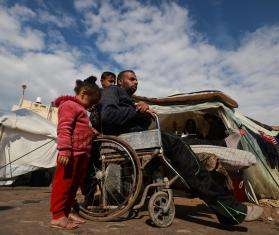New York February 18, 2020 –Shelling and airstrikes are triggering mass displacement in northwestern Syria as government forces and their Russian allies continue their offensive into the country’s last opposition-held area. Towns and displacement camps west of Aleppo were hit by shelling in recent days, and roads are packed with vehicles as people flee towards a safe area that gets smaller every day.
“People are facing a desperate situation,” says Julien Delozanne, Doctors Without Borders/Médecins Sans Frontières (MSF) head of mission for Syria. “Attacks are now taking place in areas that were previously considered to be safe. The people fleeing north are being squeezed into a territory that is getting smaller and smaller, between the front line to the east and the closed Turkish border to the west. Living conditions in the camps for displaced people are already harsh. If the military operation continues, a new influx of people to the area will make the situation even worse.”

Syrian government forces have gained control of the highway connecting the cities of Damascus and Aleppo and are now pushing west, threatening densely populated areas to the west of Aleppo.
On February 14 and 15, shelling hit camps located around the town of Sarmadah, where tens of thousands of people fleeing the fighting in southern Idlib had recently arrived. Several people were wounded and tents were destroyed. The town of Takad—about 12 miles east of Sarmadah—has been attacked multiple times since February 13, forcing most of the town’s residents to flee.
“Most people are fleeing Takad because of the recent attacks by artillery, missiles, and warplanes,” says Mustafa Ajaj, director of the health center supported by MSF in Takad. “The only people who have stayed are the ones who can’t afford a vehicle or don’t know where to go. We are moving our medical supplies to another location and I am looking for a safe place to resume our activities in an area where the medical needs are becoming more and more urgent. But we have left a few basic medical supplies for the people who are still in Takad.”
The hospital in the city of Al Atareb, which MSF supplied with emergency kits, had to close on February 16 after attacks on the city. The hospital in Darat-Izaa closed on February 17 amid concerns it would be bombed. There are no more functioning hospitals in rural western Aleppo province.
As the situation constantly changes, people in northern Idlib province and western Aleppo province—many of whom have already been displaced multiple times—are plagued by uncertainty. “No one knows what the situation will be tomorrow, only that there are bombings and that government forces are advancing,” says an MSF doctor working in Deir Hassan camp, about 18 miles west of Aleppo. “We live in fear and stress.”

Some 900,000 people have been displaced within northwest Syria since December 1, 2019, according to the United Nations. Camps for displaced people are overwhelmed and finding rooms to rent in towns at a safe distance from the bombing is reportedly impossible. With nowhere else to go, people are pitching tents on hillsides and roadsides or sleeping out in the open.
Northern Idlib and western Aleppo provinces are now scattered with informal settlements where displaced people are living in harsh conditions with little protection from the winter cold. Last week, temperatures fell below freezing and heavy snow blocked many roads. A family of four died of suffocation after burning poor quality fuel to heat their tent. “Our humanitarian situation is very bad,” a father told an MSF team during an aid distribution in a camp. “No heating. No bread. No water. We are burning the leaves of olive trees to get warm. We need support.”
“Whenever the bombing intensifies, new people are arriving,” says the MSF doctor in Deir Hassan camp. “Most people are unable to find shelter in the towns to which they flee, so they are forced to pitch their tents wherever they can. These areas are covered in tents, and the closer you get to the Turkish border, the more tents there are. Those who cannot afford a tent are sharing tents with other families. You also see people sitting on roadsides and under olive trees with blankets. Some fled with nothing more than the clothes they were wearing.”
“There is death under the bombing, and there is another death in the camps—not immediate, but delayed,” said a displaced man who recently arrived with his family to one of the camps where MSF works.

An MSF mobile clinic has treated many patients for respiratory infections as a result of their living conditions and the winter weather. Our teams have also provided medical care to many pregnant women and children in recent weeks.
MSF is also responding to the needs of newly arrived people with distributions of essential relief items in different locations in rural Idlib province. Since December 1 we’ve provided blankets, winter clothes, and hygiene kits to more than 13,000 people in more than 20 camps and informal settlements in Harim, Salqin, Sarmadah, Killi, and Maarat Misrin, as well as heating materials to help people keep warm.
MSF also distributes drinking water to tens of thousands of people in camps. But it’s increasingly difficult for us to meet the huge and growing needs.
Some camps west of Aleppo were evacuated over the weekend. Those who can afford to pay for transport are heading north towards Afrin and Azaz, near the Turkish border. Others travel to towns that are closer. But no matter where they go, no one is sure that they will receive any assistance.
“The war has been going on for nearly nine years,” says the MSF doctor in Deir Hassan camp, “But this year alone is equivalent to the past nine years if you consider all the difficulties we are living through.”





